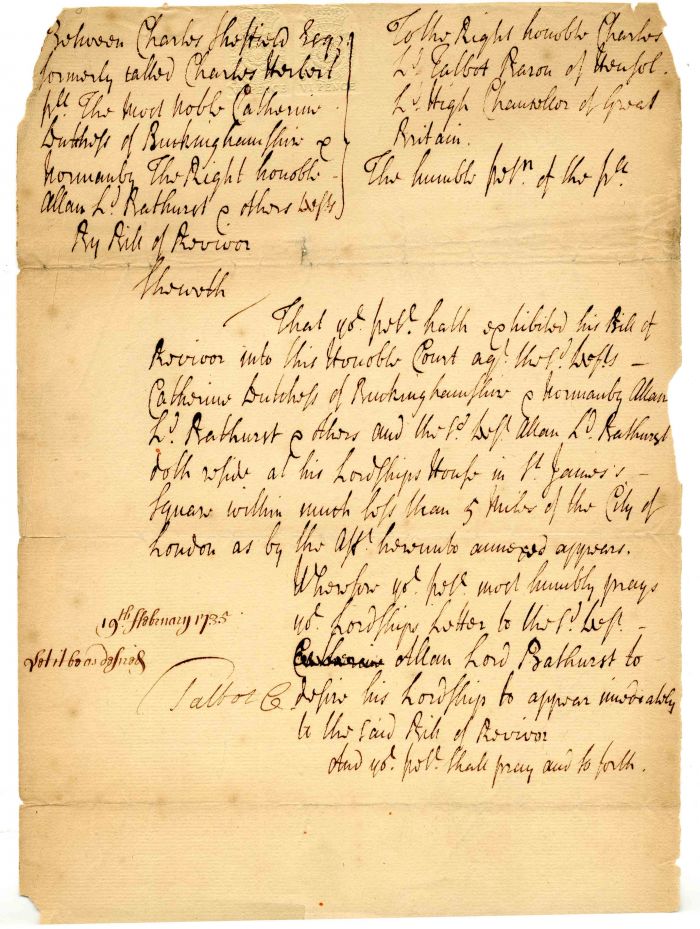Early Letter to the Court against the Lords
Inv# AM1389
Very early letter to the Court of Great Britain against the Lords. Very interesting!
The Supreme Court (initialism: UKSC or the acronym: SCOTUK) is the final court of appeal in the United Kingdom for all civil cases, as well as for criminal cases originating in England, Wales and Northern Ireland. It also hears cases of the greatest public or constitutional importance affecting the whole population.
The Court usually sits in the Middlesex Guildhall in Westminster, though it can sit elsewhere and has, for example, sat in the Edinburgh City Chambers, the Royal Courts of Justice in Belfast, and the Tŷ Hywel Building in Cardiff.
The United Kingdom has a doctrine of parliamentary sovereignty, so the Supreme Court is much more limited in its powers of judicial review than the constitutional or supreme courts of some other countries. It cannot overturn any primary legislation made by Parliament. However, as with any court in the UK, it can overturn secondary legislation if, for an example, that legislation is found to be ultra vires to the powers in primary legislation allowing it to be made.
Further, under section 4 of the Human Rights Act 1998, the Supreme Court, like some other courts in the United Kingdom, may make a declaration of incompatibility, indicating that it believes that the legislation subject to the declaration is incompatible with one of the rights in the European Convention on Human Rights. Such a declaration can apply to primary or secondary legislation. The legislation is not overturned by the declaration, and neither Parliament nor the government is required to agree with any such declaration. However, if they do accept a declaration, ministers can exercise powers under section 10 of the Human Rights Act to amend the legislation by statutory instrument to remove the incompatibility or ask Parliament to amend the legislation.
As authorised by the Constitutional Reform Act 2005, Part 3, Section 23(1), the Supreme Court of the United Kingdom was formally established on 1 October 2009 and is a non-ministerial government department of the Government of the United Kingdom. Section 23 of the Constitutional Reform Act limits the number of judges on the Court to 12, though it also allows for this rule to be amended, to further increase the number of judges, if a resolution is passed in both Houses of Parliament.
It assumed the judicial functions of the House of Lords, which had been exercised by the Lords of Appeal in Ordinary (commonly called "Law Lords"), the 12 judges appointed as members of the House of Lords to carry out its judicial business as the Appellate Committee of the House of Lords. Its jurisdiction over devolution matters had previously been exercised by the Judicial Committee of the Privy Council.
The House of Lords, formally The Right Honourable the Lords Spiritual and Temporal of the United Kingdom of Great Britain and Northern Ireland in Parliament assembled, is the upper house of the Parliament of the United Kingdom. Membership is by appointment, heredity or official function. Like the House of Commons, it meets in the Palace of Westminster.
Members of the House of Lords are drawn from the peerage, made up of Lords Spiritual and Lords Temporal. The Lords Spiritual are 26 archbishops and bishops in the established Church of England. Most Lords Temporal are life peers, appointed by the monarch on the advice of the Prime Minister or House of Lords Appointments Commission, but they also include hereditary peers.
Membership was once an entitlement of all hereditary peers, other than those in the peerage of Ireland, but the House of Lords Act 1999 restricted it to 92 hereditary peers. Since the resignation of the Countess of Mar in May 2020 (who had been the only female hereditary peer since 2014), none of these 92 is female. Most hereditary peerages can be inherited only by men.
While the House of Commons has a defined number of members, the number of members in the House of Lords is not fixed. Currently, it has 789 sitting members. The House of Lords is the only upper house of any bicameral parliament in the world to be larger than its lower house, and is the second-largest legislative chamber in the world behind the Chinese National People's Congress.
The House of Lords scrutinises bills that have been approved by the House of Commons. It regularly reviews and amends Bills from the Commons. While it is unable to prevent Bills passing into law, except in certain limited circumstances, it can delay Bills and force the Commons to reconsider their decisions. In this capacity, the House of Lords acts as a check on the House of Commons that is independent from the electoral process. Bills can be introduced into either the House of Lords or the House of Commons. While members of the Lords may also take on roles as government ministers, high-ranking officials such as cabinet ministers are usually drawn from the Commons. The House of Lords has its own support services, separate from the Commons, including the House of Lords Library.
The Queen's Speech is delivered in the House of Lords during the State Opening of Parliament. In addition to its role as the upper house, until the establishment of the Supreme Court in 2009, the House of Lords, through the Law Lords, acted as the final court of appeal in the United Kingdom judicial system. The House also has a Church of England role, in that Church Measures must be tabled within the House by the Lords Spiritual.









Ebay ID: labarre_galleries